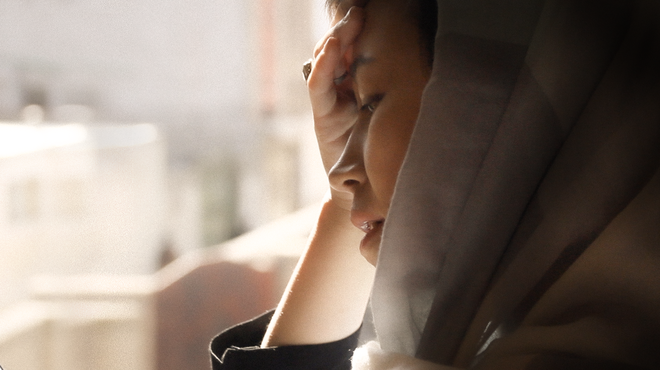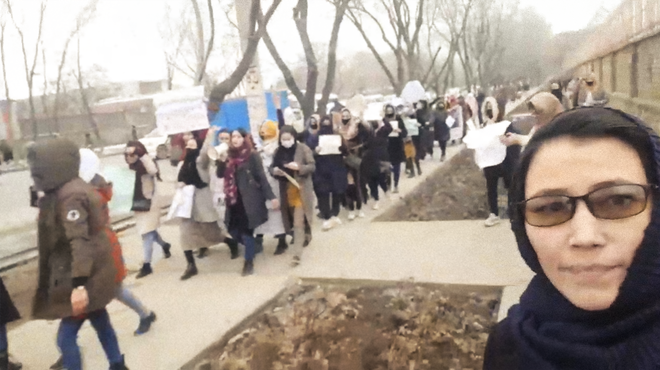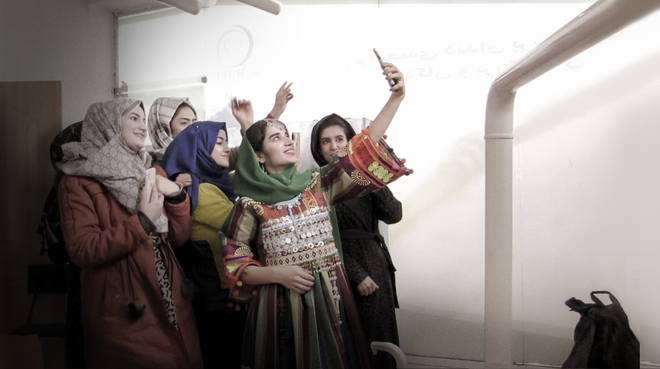Chaotic scenes unfolded in Kabul when America withdrew from Afghanistan in 2021 and the Taliban marched into the streets of the city and captured it without resistance. While the world watched with horror, desperate Afghans, who suddenly lost their last hope of freedom, tried to flee the city to safety.
Amidst this bedlam, a nascent unorganised street protest movement was shaping up in Kabul. It was led by women, who were at the receiving end of the Taliban’s brutal dictatorship that curtailed women’s rights and freedom.
Filmmaker Sarah Mani’s documentary Bread and Roses, which premiered at the recently-concluded Cannes Film Festival, captures this brief moment in history — a motley group of brave Afghan women marched against one of the most brutal regimes in modern history, demanding freedom from oppression. Holding handmade placards and chanting, “Bread, work, education and freedom,” these women were the only resistance the Taliban faced in Kabul.

Bread and Roses follows three activists who organised protests even as there was little hope of regaining freedom. Initially, women were disallowed access to universities and workplaces. As the regime’s stronghold over the Afghan people strengthened, it tightened the screw on one of the last remaining liberties by making it mandatory for women to be veiled and accompanied by a chaperone in public places.
Produced by Jennifer Lawrence’s Excellent Cadaver production, the documentary presents itself as a vital artefact in narrating this crucial moment in Afghanistan’s history. Her 2018 documentary, A Thousand Girls Like Me, follows an Afghan woman’s fight for justice in the country’s unfair judicial system skewed against women.
Speaking on the occasion of the film’s screening at the festival, Mani says her decision to make Bread and Roses was primarily to tell the stories of these brave women. This meant the crew was thrown under dangerous circumstances with some even risking arrests, but the urgency was additionally warranted as women’s mere existence became precarious under Taliban’s theocratic rule.
Mani, who is in exile, travelled to Venice in 2021 for the film festival but couldn’t return to Afghanistan after the condition worsened. The film was mostly shot by activists secretly during the tumultuous Taliban takeover in the past two years, putting their lives in danger, and Mani claims numerous women came forward with their stories for the project. Mani directed the film under extenuating circumstances and it made it into the Cannes lineup as a last-minute entry, thanks to understanding organisers.

In the near-complete absence of hope, Bread and Roses beseeches its audience to pay attention to the plight of Afghan women. Braided together by using mobile footage recorded by women protestors, the film walks the viewers through slushy alleys and streets where tear gas and water cannons run wild. Mani says she was inspired to call the film Bread and Roses after a political slogan by the American poet James Oppenheim; it signifies the fight for basic rights and dignity.
ALSO READ: Taliban warn women can’t take entry exams at universities
The lives of Zahra, a dentist who runs her own clinic, Sharifeha, a former Afghan government employee, and women’s rights activist Tarannum form the backbone of the film. “As a woman from a conservative family, I was given a good education and never had to suffer,” Zahra says in the film. She knew Afghanistan was at a breaking point and needed her to stand up for her fellow women.
Strong women are often lonely, says Tarannum as she records herself with her mobile phone from a safehouse in rural Pakistan where she is hunkered down with a few other women fleeing the Taliban. Even when Tarannum and other women are given an ultimatum to leave the safehouse, a footage shows her celebrating the Afghani new year, an attemp to find normalcy in penury.

Sharifeh is a silent protestor whose family, especially her mother, is in the dark about her revolutionary daughter. She constantly records herself telling the camera that her parents will boot her out of the house if they found out she’s part of the ongoing protests. She could no longer work in her office and turns to street protests, rebelling against an oppressive regime even in the face of daunting brutality.
Bread and Roses tries to present little glimmers of hope in the midst of mounting despair.
As she prepares to leave the country after being jailed and roughed up by the Taliban, Zahra trains the staff at her dental clinic to care for patients in her absence. This hope proves ultimately short-lived and as the film follows her story a few months later. Zahra’s empty clinic is derelict and abandoned.
Mani asserts that men are responsible for the current situation in Afghanistan and there should be an urgent intervention. She also warns the world against treating the Taliban with kid gloves. “To make peace with the Taliban is to condemn the women of Afghanistan,” she declares.
The film hits harderwhen it shows children, mostly Zahra’s nephews, denouncing the Taliban and demanding freedom as they shout slogans from the confines of their homes. “I wish all this is a bad dream,” one of them screams into the camera.
What emerges as the film chronicles these women’s lives is the heartbreaking realisation that these little girls may be confined to their homes as long as the Taliban is in power. And yet, this exemplifies the film’s theme of resilience in the face of harsh realities, even as the battles over women’s rights in Afghanistan may have just begun.
Mani acknowledges that women’s lives have changed forever under the Taliban dictatorship and their everyday reality must not go unnoticed. “This is a cruel reality we cannot afford to ignore,” she adds.







